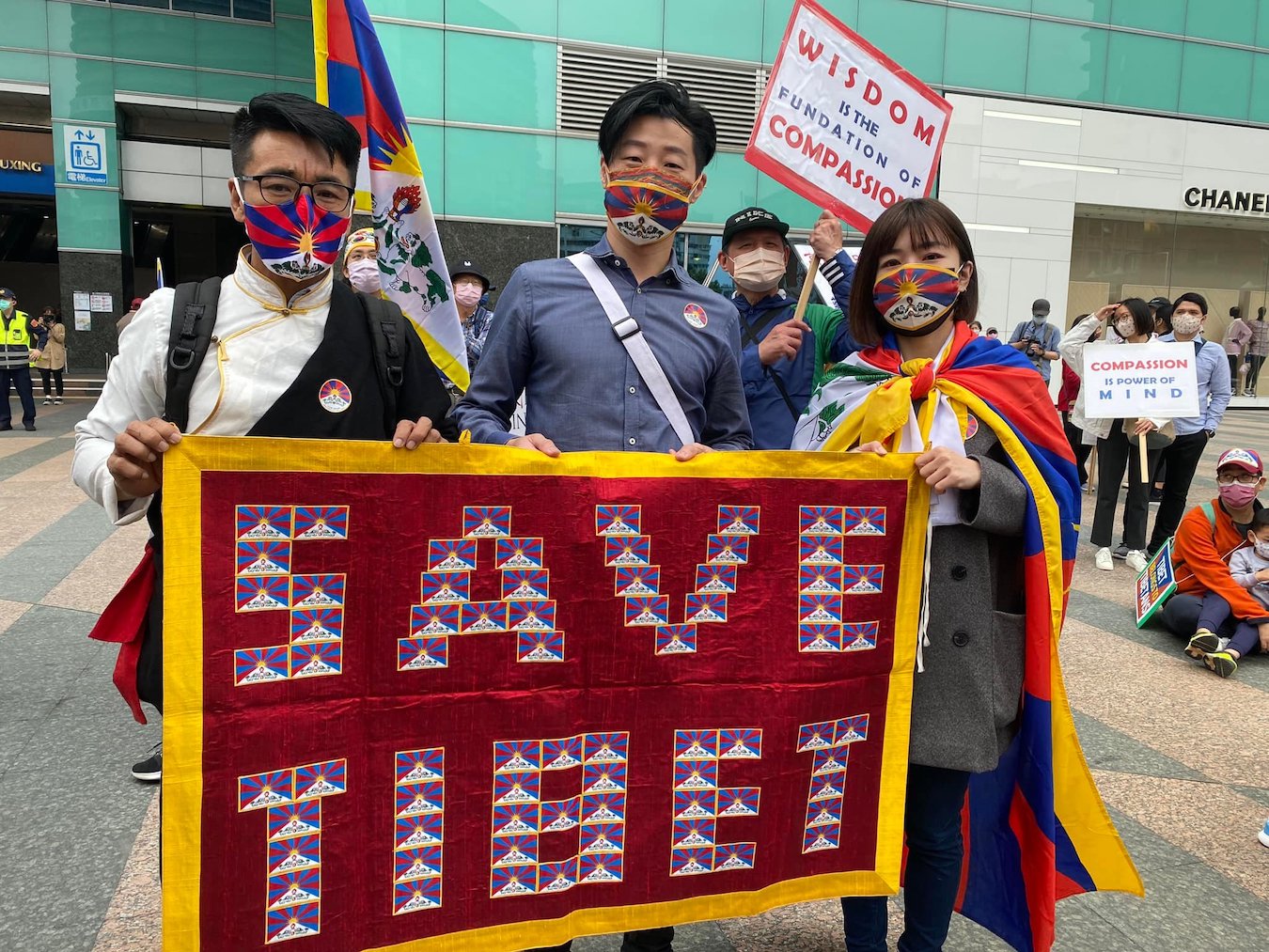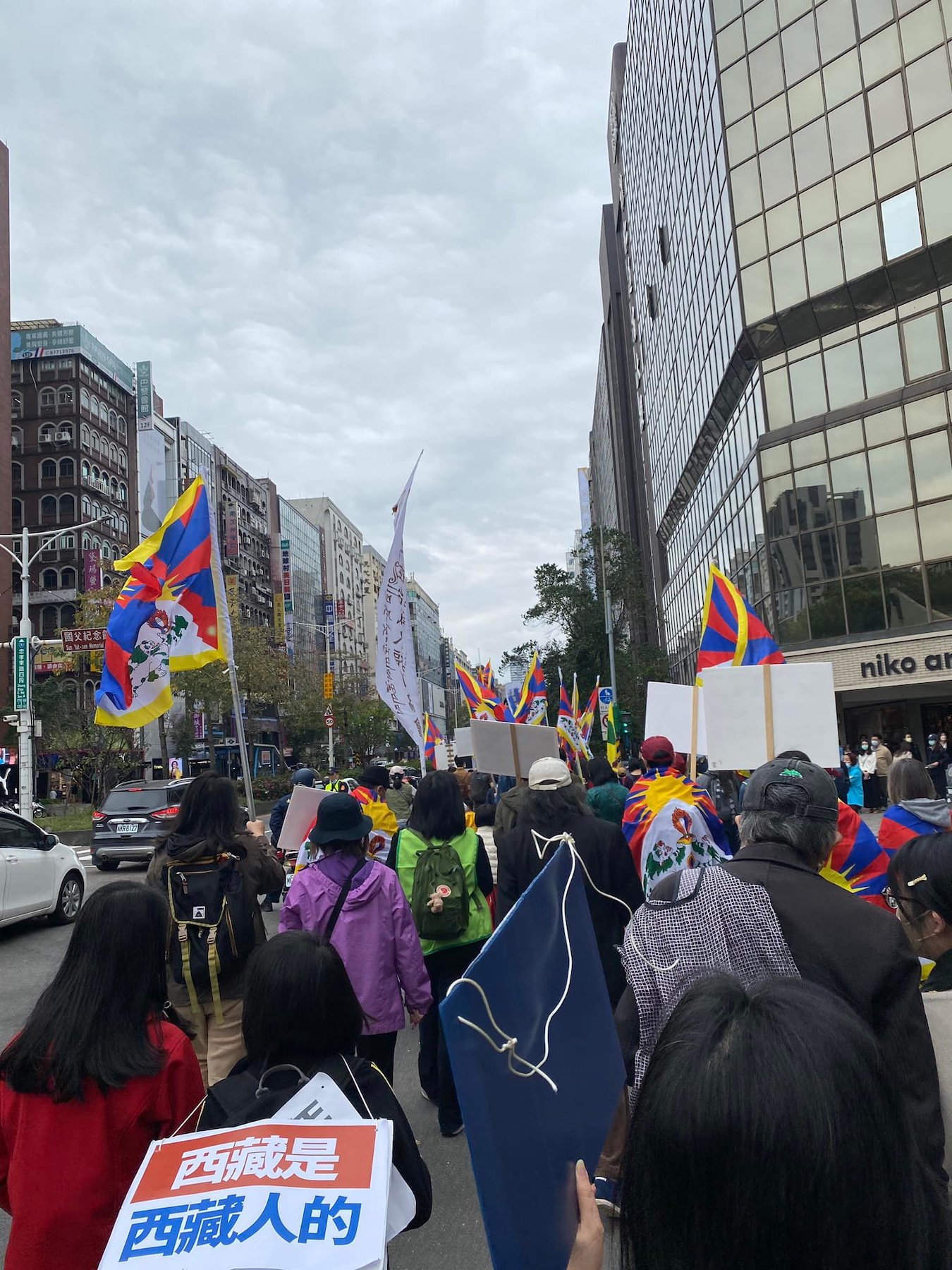by Brian Hioe
語言:
English
Photo Credit: 西藏台灣人權連線 Human Rights Network for Tibet and Taiwan/Facebook
THE 63RD ANNIVERSARY of Tibetan Uprising Day was commemorated last Saturday in Taipei, seeing as the actual anniversary of Tibetan Uprising Day falls on a Thursday this year. To mark the event, around 100 gathered outside of the SOGO department store near Zhongxiao Fuxing, with speeches and performances held.
This is what takes place to mark Tibetan Uprising Day yearly in Taipei, with a cycling for Tibet event of bike riders traveling around Taipei with the Tibetan flag also usually held annually in the weeks prior to Tibetan Uprising Day. Although some commemorations of Tibetan Uprising Day have been reduced in scale in past years, due to COVID-19, the situation remains stable in Taiwan.
Speakers at this year’s commemoration of Tibetan Uprising Day included a number of pan-Green legislators. This included independent Freddy Lim, Handy Chiu of the NPP, and Wu Yu-chin and Fan Yun of the DPP. Lim in particular is known for his support of Tibetan advocacy in Taiwan, having long been active on the issue.
 From left to right, Tashi Tsering, Freddy Lim, and Lin Ying-meng. Photo credit: 西藏台灣人權連線 Human Rights Network for Tibet and Taiwan/Facebook
From left to right, Tashi Tsering, Freddy Lim, and Lin Ying-meng. Photo credit: 西藏台灣人權連線 Human Rights Network for Tibet and Taiwan/Facebook
Otherwise, there were representatives of Tibetan organizations including the Human Rights Network for Taiwan and Tibet and Taiwan Tibetan Welfare Association. Civil society groups that were present included stalwarts of civil society such as the Taiwan Association for Human Rights, Taiwan Association to End the Death Penalty, and other organizations. While these organizations do not advocate for causes directly related to Tibet or broader issues concerning China, progressive civil society organizations in Taiwan often take part in each other’s events.
Traditional prayer ceremonies took place before the march, with a prayer ceremony also scheduled to take place on March 10th outside of the Bank of China. Likewise, a performance symbolized the demolition of a 99-foot-tall Buddha statue in Tibet late last month, the third confirmed demolition of a Buddha statue in Tibet since December.
Actions by the Chinese government to crack down on political freedoms in Tibet continue, then. Moreover, many Tibetans remain in exile in Dharamsala or elsewhere, unable to return. One of the organizers of the event, Tashi Tsering, was himself born outside of Tibet and has never seen his homeland. Tsering is one of the most well-known Tibetan activists in Taiwan, as a representative of the Tibetan government-in-exile.
Speakers also drew attention to the difficulties facing Tibetans abroad, including difficulties for Tibetans to work or study in Taiwan, due to their identification documents. A number of Tibetans from the Tibetan overseas community in Dharamsala travel to Taiwan for work or travel, due to their inability to travel to China. Nevertheless, this is complicated by the ROC constitution and framework, even as ROC institutions such as the Mongolian and Tibetan Affairs Commission of the Executive Yuan have been abolished.
More generally, the commemoration of Tibetan Uprising Day took place one day prior to a solidarity rally for Ukraine. This involved a number of the same participants, including the presence of the Taiwan Association for Human Rights, or speakers such as Freddy Lim. This was also brought up by speakers, given longstanding concerns about annexation in Taiwan, as sparked again by the invasion of Ukraine.
 Photo credit: 西藏台灣人權連線 Human Rights Network for Tibet and Taiwan/Facebook
Photo credit: 西藏台灣人權連線 Human Rights Network for Tibet and Taiwan/Facebook
Unsurprisingly, part of the pan-Green camp’s support for Tibetan causes is due to Taiwan also sharing threats from China. In the past, this has also led to support for Hongkongers. However, it proves harder for there to be concerted action taken in support of Tibetans, when this is not a pressing electoral issue, or one that can be capitalized on for votes.
Indeed, one notes that despite the imprisonment of over one million Uyghurs in Xinjiang for their religion, there has been relatively little action by the Taiwanese government to provide assistance to Uyghurs. The Tsai administration has also been criticized for proclaiming that it would take action to assist Hongkongers, but perhaps not doing as much as it could. For its part, the Tsai administration is probably concerned about retaliation from the Chinese government, which could be taken against Taiwanese in China or through military threats directed at Taiwan.
It remains to be seen what advocacy could push for changes on this front in Taiwan. More broadly, the plight of Tibetans around the world remains unaddressed, with commemorations of Tibetan Uprising Day proving an opportunity to remind of this fact.

